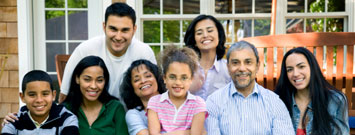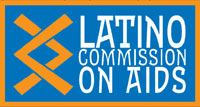National Latino AIDS Awareness Day
 October 15 is National Latino AIDS Awareness Day (NLAAD). This year's theme is "Hispanics United to End AIDS." Latinos are encouraged to support HIV testing and HIV prevention education, which can save lives.
October 15 is National Latino AIDS Awareness Day (NLAAD). This year's theme is "Hispanics United to End AIDS." Latinos are encouraged to support HIV testing and HIV prevention education, which can save lives.
HIV and Hispanics/Latinos
The HIV epidemic continues to seriously affect Hispanic/Latino communities. Consider this:
- Hispanics/Latinos represent approximately 16% of the U.S. population, but accounted for 20% of new HIV infections in 2009, the most recent year these data were available.
- Hispanics/Latinos accounted for 19% of people living with HIV infection in 2009.
- Since the epidemic began, almost 18,000 Hispanics/Latinos with AIDS have died in the United States and its dependent areas. In 2009, nearly 3,300 Hispanic/Latino individuals with AIDS died.
 Among Hispanics/Latinos, gay and bisexual men are most affected by HIV, accounting for 64% of the 9,400 new HIV infections among Latinos in 2009.
Among Hispanics/Latinos, gay and bisexual men are most affected by HIV, accounting for 64% of the 9,400 new HIV infections among Latinos in 2009.
The impact of HIV on Hispanics/Latinos is not directly related to race or ethnicity, but rather to harsh realities and challenges faced by some communities, including lower awareness of HIV status, poverty, access to care, stigma, migration, acculturation (the process of adopting the cultural traits or social patterns of another group) and homophobia.
The National HIV/AIDS Strategy calls for prioritizing prevention efforts in the populations where HIV is most heavily concentrated and for alleviating racial and ethnic disparities, like those documented among Hispanics/Latinos. To achieve the strategy's goals, CDC is implementing High-Impact Prevention [PDF - 258KB], a new approach designed to maximize available HIV prevention resources and have the greatest impact on the U.S. HIV epidemic.
National Latino AIDS Awareness Day (NLAAD)


Hispanic/Latino communities, with assistance from federal, state and local public health agencies, have increased efforts to address the effects of the epidemic. The Latino Commission on AIDS and the Hispanic Federation, in partnership with faith and community organizations, initiated NLAAD in 2003 to raise awareness of issues concerning HIV and AIDS within the Hispanic/Latino population living in the United States and abroad. Annually, the NLAAD campaign works to build capacity for non-profit organizations and health departments to reach Latino communities, promote HIV testing and provide HIV prevention information and access to care.
What Can You Do?
- Learn about HIV and AIDS. Educate yourself, friends, and family about HIV and AIDS and what you can do to protect yourself.
- Get tested for HIV. To find a testing site near you, call 1-800-CDC-INFO (232-4636), visit http://hivtest.cdc.gov, or, on your cell phone, text your ZIP code to KNOW IT (566948). The Centers for Disease Control and Prevention (CDC) recommends that all adolescents and adults be tested for HIV at least once in their lifetime—regardless of whether they think they are at risk. Unfortunately, currently, more than half of Hispanics/Latinos have never been tested for HIV—the first step in protecting yourself and your partners.
- Practice safer sex: Be sexually active with only one person who has agreed to be sexually active only with you, or don’t have sex.
- Get care! If you are living with HIV, appropriate treatment can keep you healthy and prevent transmission to others.
- Speak out against stigma, homophobia, racism, and other forms of discrimination associated with HIV and AIDS.
- Volunteer with HIV and AIDS organizations that work within Hispanic/Latino communities.
Organizations are encouraged to
- Promote NLAAD internally and within their broader community. Check out the organizations and agencies that are getting involved in support of NLAAD across the nation. HIV awareness and testing events will provide thousands of Hispanics/Latinos with the important information they need to protect their health, their loved ones, and to get involved.
- Encourage employees to get involved in NLAAD activities.
- Educate staff about HIV and AIDS.
- Develop HIV and AIDS policies for the workplace.
More Information
- National Latino AIDS Awareness Day 2012
- To find an HIV test site near you from the National HIV Testing Database, a CDC-sponsored service available 24 hours a day: National HIV and STD Testing Resources (English) and Recursos nacionales para las pruebas del VIH y ETS (En Español)
- CDC maintains a Spanish-language website, as well as Spanish-language versions of many HIV/AIDS topics, including HIV Among Latinos (El VIH en los latinos) and Basic Information about HIV and AIDS (Información básica sobre el VIH y el SIDA).
- Other federal government web sites that contain Spanish-language HIV/AIDS resources include AIDS.gov and InfoSIDA.
- Act Against AIDS is a 5-year multifaceted communication campaign launched by CDC and the White House to combat complacency about HIV and AIDS in the United States. One component of Act Against AIDS is Let's Stop HIV Together, which raises awareness about HIV and its impact on the lives of all Americans, and fights stigma by showing that people with HIV are mothers, fathers, friends, brothers, sisters, sons, daughters, partners, wives, husbands, and coworkers.
- Latino Commission on AIDS (English)
The Latino Commission on AIDS is a nonprofit membership organization dedicated to fighting the spread of HIV/AIDS in the Latino community.
Get email updates
To receive email updates about this page, enter your email address:
Contact Us:
- Centers for Disease Control and Prevention
1600 Clifton Rd
Atlanta, GA 30333 - 800-CDC-INFO
(800-232-4636)
TTY: (888) 232-6348 - Contact CDC-INFO



